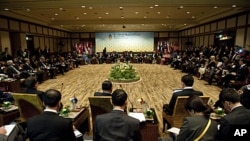North and South Korean leaders met for a second time on Saturday, the final day of the Association of Southeast Asian Nations' (ASEAN) security forum in Bali. ASEAN leaders cite facilitating the talks between the Koreas and the adoption of guidelines they hope will lead to a resolution to disputes in the South China Sea as major achievements of the conference.
A U.S. official described the talks between North and South Korean officials as substantial, productive and civil in tone. Still there was no announcement that the six party talks to end North Korea's nuclear weapons program would resume.
Foreign ministers from all six countries involved in the negotiations, the United States, China, Russia, Japan and North and South Korea, all attended the ASEAN conference.
ASEAN Chairman and Indonesian Foreign Minister Marty Natalegawa said ASEAN's efforts to bring the two sides together is a sign of the organization's evolving role in fostering peace in the region.
"The conducive atmosphere we were able to facilitate [has] made it possible for our two brothers North and South Korea to be able to have their meetings at the sidelines of our meetings here in Bali," said Natalegawa. "It must be emphasized that meetings of this type, informal, at the technical, at the senior official, indeed at the ministerial level would not have happened without a purposeful, deliberative and even low key efforts on the part of many of us."
The meetings between the Koreas were the first such session since 2008 when North Korea walked out on disarmament talks to protest international criticism of its missile and nuclear tests. Relations with South Korea have been tense ever since.
Pyongyang, which badly needs humanitarian and economic aid, has indicated in recent months that it might be ready to return to the negotiations.
North Korea's main ally, China, has been pressing for a speedy resumption of the talks.
The U.S. said it was grateful to see dialogue, but does not want to return to the unsuccessful past strategy of offering economic aid for concessions, only to see North Korea renege on its promises.
ASEAN leaders also cited the adoption of a preliminary plan to resolve territorial disputes in the potentially resource-rich South China Sea as another major achievement of the conference. China and all ASEAN members agreed to a set of broad guidelines to implement a 2002 Declaration of Conduct in the South China Sea.
One-third of the world's shipping transits through the strategic waterway and China claims the sea in its entirety. The Philippines, Vietnam, Taiwan, Brunei and Malaysia hold conflicting territorial claims.
But not all ASEAN delegates are happy with the agreement. Philippines Foreign Secretary Albert del Rosario says the guidelines do not directly address the disputed areas or the validity of China's claim to territory over 1,000 kilometers from its shore. Instead he wants to see a framework that is specific, determinable and measurable.
"I think that guidelines as they are now are incomplete," said del Rosario. "That to effectively implement the guidelines you need to find a process to segregate the disputed areas from the undisputed areas. We submitted a framework for that purpose and that framework is going to be vetted by legal experts from the ASEAN countries and this will take place in Manila [at the] end of September."
He says the Philippines is bolstered by the U.S. stated views that parties comply with international law to resolve their disputes.
ASEAN leaders says some progress was also made at the annual security forum to urge Burma to make democratic reforms before it takes over the chairmanship of ASEAN in 2014, and to reinforce ASEAN's continued role in mediating a border dispute between Cambodia and Thailand.





